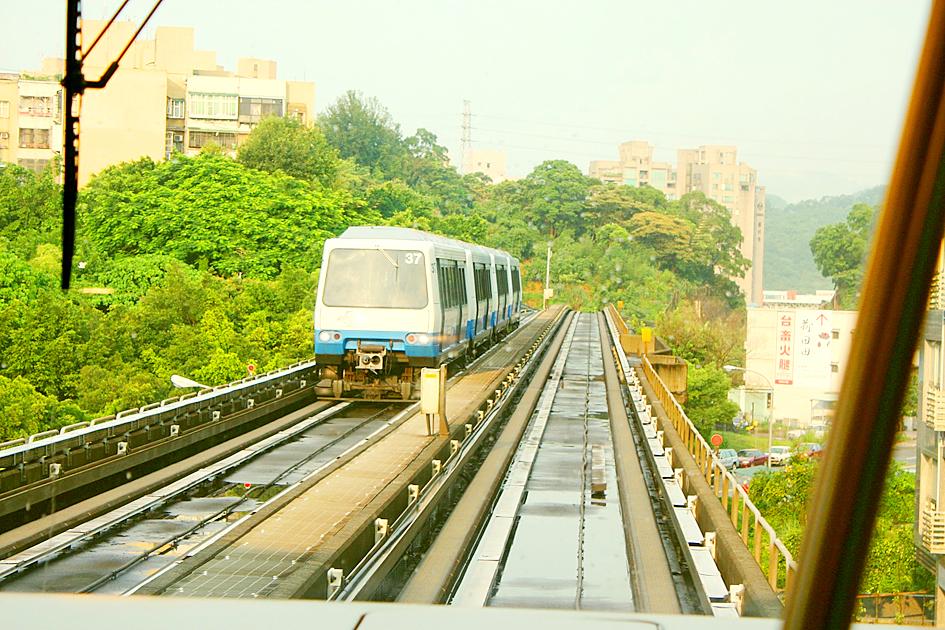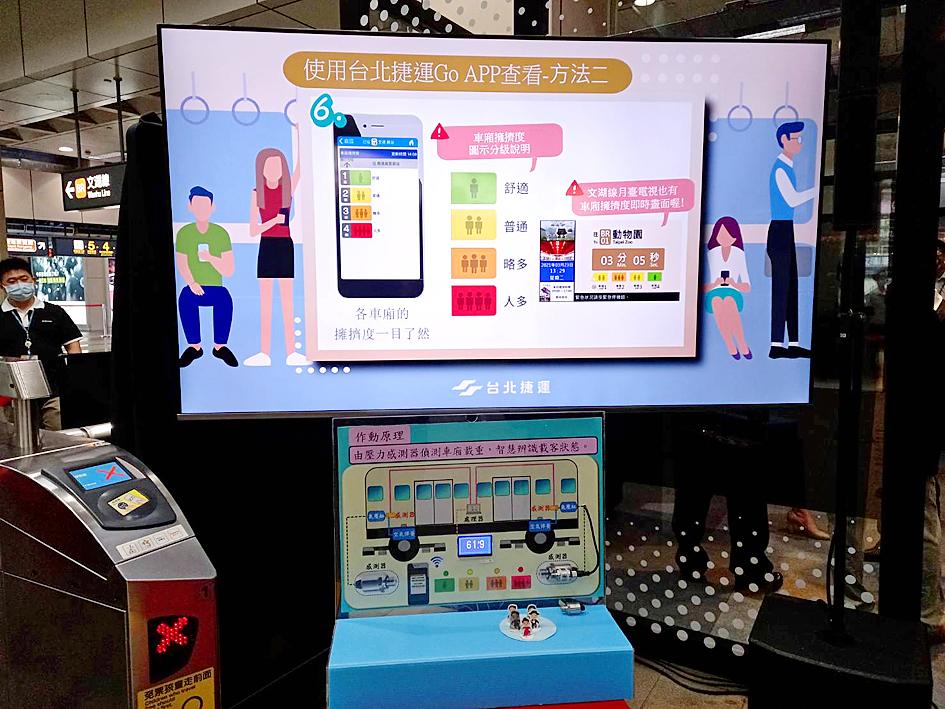Passengers of Taipei MRT System’s Wenhu Line (Brown Line) can check how crowded the carriages are using the Taipei MRT app, as well as displays in the stations, Taipei Rapid Transit Corp (TRTC) said yesterday.
The company has made the service available on the busiest MRT Line after testing it for one year on the Bannan Line (Blue Line). It is also offering it at a time when the nation has seen a rise in local COVID-19 cases.
A survey conducted by TRTC in 2016 identified the 10 most crowded sections of MRT lines during peak hours, nine of which were on the Brown Line. The most busy section on the list was between Zhongxiao Fuxing and Nanjing Fuxing stations.

Photo courtesy of Chinatrust Real Estate Co
From 8am to 9am, an average of 4.07 people stood within 1m2 on trains from Zhongxiao Fuxing to Nanjing Fuxing, the survey showed.
Between 6pm and 7pm, trains from Nanjing Fuxing to Zhongxiao Fuxing stations had an average of 3.96 people standing in 1m2, the survey showed.
The company said that its self-developed alert system uses four levels to indicate how crowded carriages are: green means passengers can move inside carriages without any trouble; yellow means passengers can move easily inside carriages; orange means carriages are slightly crowded and passengers need to turn sideways to pass each other; and red means carriages are very crowded and it is difficult for passengers to move around.

Photo: Tsai Szu-pei, Taipei Times
By next year, the service would also be available for passengers on Tamsui-Xinyi Line (Red Line), Songshan-Xindian Line (Green Line) and the Zhonghe-Xinlu Line (Orange Line), TRTC said.
In other news, people at Zhongxiao Fuxing Station can now wait for a train at “Metro Corner,” where they can watch updates of MRT services, weather reports and breaking news, the company said.
The corner also has an automatic coffee machine and a vending machine, which allow people to pay using cash or mobile payments, it added.

The Ministry of Economic Affairs has fined Taobao NT$1.2 million (US$36,912) for advertisements that exceed its approved business scope, requiring the Chinese e-commerce platform to make corrections in the first half of this year or its license may be revoked. Lawmakers have called for stricter enforcement of Chinese e-commerce platforms and measures to prevent China from laundering its goods through Taiwan in response to US President Donald Trump’s heavy tariffs on China. The Legislative Yuan’s Finance Committee met today to discuss policies to prevent China from dumping goods in Taiwan, inviting government agencies to report. Democratic Progressive Party Legislator Kuo Kuo-wen (郭國文) said

The Ministry of Economic Affairs has fined Taobao NT$1.2 million (US$36,900) for advertisements that exceeded its approved business scope and ordered the Chinese e-commerce platform to make corrections in the first half of this year or its license would be revoked. Lawmakers have called for stricter supervision of Chinese e-commerce platforms and more stringent measures to prevent China from laundering its goods through Taiwan as US President Donald Trump’s administration cracks down on origin laundering. The legislature’s Finance Committee yesterday met to discuss policies to prevent China from dumping goods in Taiwan, inviting government agencies to report on the matter. Democratic Progressive Party

Taiwan and its Pacific ally Tuvalu on Tuesday signed two accords aimed at facilitating bilateral cooperation on labor affairs, according to Taiwan’s Ministry of Foreign Affairs (MOFA). The governments inked two agreements in Taipei, witnessed by Foreign Minister Lin Chia-lung (林佳龍) and visiting Deputy Tuvaluan Prime Minister Panapasi Nelesone, MOFA said in a news release. According to MOFA, the agreements will facilitate cooperation on labor issues and allow the two sides to mutually recognize seafarers’ certificates and related training. Taiwan would also continue to collaborate with Tuvalu across various fields to promote economic prosperity as well as the well-being of their

Sung Chien-liang (宋建樑), who led efforts to recall Democratic Progressive Party (DPP) Legislator Lee Kun-cheng (李坤城), was released on bail of NT$80,000 today amid outcry over his decision to wear a Nazi armband to questioning the night before. Sung arrived at the New Taipei District Prosecutors’ Office for questioning in a recall petition forgery case last night wearing a red armband bearing a swastika, carrying a copy of Adolf Hitler’s Mein Kampf and giving a Nazi salute. Sung left the building at 1:15am without the armband and covering the book with his coat. Lee said today that this is a serious